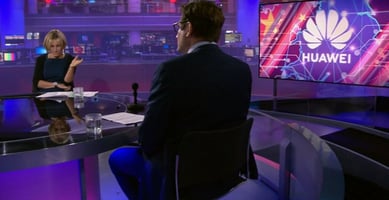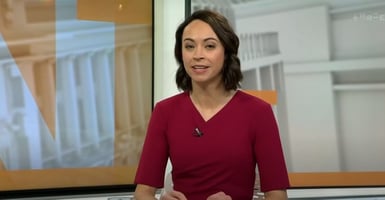Giving feedback to senior leaders about their latest media interview can be a tough conversation.
How does it feel when your competitors appear on radio and TV sharing their stories?
What about when they have a prominent article in a national newspaper?
Do you wonder how it was achieved and why it wasn't you?
Often the difference is not the story but having someone to tell it effectively.
So, how can you become a successful media spokesperson?
Here are 10 tips - from our 40 years of experience in delivering media training - on how to become a media spokesperson journalists turn to over and over again.
Tip 1: Be visible
Where do you turn to for information?
Chances are it will be Google and social media.
Journalists are the same.
They use these channels to find the right person for their media interviews. So, use them to highlight your position as a thought leader and specialist subject expert.
Publish blogs on your company website covering subjects you want to discuss in the media. And share them on your socials.
It will increase your visibility and help ensure your website appears on the first page of Google – just like you, reporters are unlikely to delve below the first page of results.
If you have previously been interviewed – and they have gone well – pin clips to the top of your social media profiles and on your website. It will show journalists the expertise they could access by talking to them.
Tip 2: Seek opportunities
Just because you may not have any news to discuss doesn't mean there isn't demand for your insight.
Could you offer an opinion on a current issue on the news agenda or a hot topic in your sector that would help reporters move it forward and create a new angle?
If you do, get in touch and let them know how you can contribute.
And get ahead by thinking about the topics you and your organisation would be willing to discuss when they are in the spotlight.
There are also journalists actively looking for companies and their spokespeople to come forward and speak to them about the stories they are covering.
Explore the #journorequest and #PRrequest hashtags reporters use on Twitter to find experts.
Tip 3: Understand the media landscape
The media landscape constantly evolves.
And that evolution happens at pace.
Growing up, daily newspapers were delivered to homes, and people read them at the breakfast table.
Now, in most cases, much of the news we consume comes from digital sources, such as websites, apps and social media channels.
Yet newspapers remain powerful, we just consume their content differently. The Daily Mail and The Guardian are among the top 10 news sites in the world, getting more than 350m views a month.
The Times newspaper now has a radio station.
Demand for news remains high. There are more TV news channels than ever, with the launch of GB News and Talk TV in recent years.
And podcasts are booming. Just under 20 per cent of people who took part in Ofcom's most recent news consumption survey said they got news from a podcast.
The high-profile News Agents podcast hit 24m downloads in the first seven months since it launched.
Successful media spokespeople are curious about how the media works and evolves, and are aware of how these changes can impact interviews.
For example, most radio studios now have cameras, and the footage is shared on social media. The rise of Zoom and Teams means many television interviews are remote - do you know how to adapt your performance for that format?
Tip 4: Be good (and a little bit naughty)
If you've wondered why the same experts seem to crop up on air and in your favourite national newspaper, one of the main factors is that they are good spokespeople.
Not all reporters are experts. They want to speak to people who can provide fresh insight and offer a different perspective. They don't want someone who repeats what we already know.
A good spokesperson engages, entertains, shares personal stories and explains key points in a way the audience will understand. In print terms, you need to be quote-worthy.
And don't be afraid to be controversial. The 'trouble' element is a big part of what makes something newsworthy. The media loves conflict.
So, go against the status quo and show why you and your company think differently about an issue. Just ensure you've practised these messages with your comms team first and have their full backing and support.
Tip 5: Be available and put the hard yards in
News happens around the clock, and deadlines are tight.
It means that as well as having access to people who can help them move stories forward, they also want media spokespeople who are available to share their thoughts.
If you are not available when they need you, they will turn to someone else. And the opportunity is lost.
Being available means being willing to go the extra mile.
You may need to get up at the crack of dawn to feature on a breakfast news programme. You could need to be ready to go for a late evening slot. Or perhaps during the weekend.
You might need to be interviewed on Zoom from your spare room.
Tip 6: Have a compelling key message
If you have been on one of our media training courses, you'll know we stress the importance of spokespeople delivering a message that resonates.
How do you do that?
Well, it starts with understanding you don't need three key messages - three is not the magic number in media interviews. It is too many.
This was something Victoria Smith, one of our expert media trainers, highlighted during a masterclass for our Media Team Academy.
“People often talk about three key messages and strategies with five pillars.
“But that will not work well – it is too much for your audience to take in.
“And if you are doing a radio interview, it may only last 90 seconds, so there is only time to land one message."
To create a powerful message, you must understand who you are talking to. What media outlet is the interview for?
Who is watching or listening? What age? What demographic? Are they professional? Male? Female?
Different newspapers, radio stations and TV programmes have different audiences.
Simplicity is another crucial component. Your message - or key point - should be a sentence of fewer than 20 words, contain plain English – no jargon (complicated language) - and take around 15 seconds to deliver.
And it needs to be supported by examples in a media interview, otherwise, it will become little more than rhetoric.
Stories and examples act as proof points. And human examples work best. Our brains like stories about people.
Repetition can be an overlooked part of message delivery. But if you want a message to resonate with the audience - your customers - you must stick with it and repeat it.
But, as we stress during our media training, don’t fall into the trap of using the same language - that will bore the journalist and the audience.
Tip 7: Be prepared to prepare
Preparation is essential.
Being prepared boosts confidence and will help you feel more comfortable about the interview.
And it reduces the chances of being caught off guard by difficult questions and anything unexpected the journalist brings into the conversation.
So, anticipate questions and wider topics that could be brought into the interview. And ensure your message and examples are fine-tuned.
Make sure you know the basics that can dent confidence.
This includes ensuring you know the exact format of the interview, what else will be included in the package, and who else the journalist is speaking to, particularly for panel discussions.
Before the interview starts, warm up your vocal cords by reading aloud a children’s book. This is also a good way of practising varying tone and adding pauses for emphasis.
But one of the most important things to remember is over-preparation poses a significant risk.
Huge interview briefing documents are hard to absorb and recall when the pressure is on in media interviews.
Even if they retain some of these responses to specific questions, spokespeople will seem like talking robots, unable to create a natural-sounding conversation.
Tip 8: Be yourself
Well, it is a little more complicated than that, as we outline in this blog.
But the journalist interviewing you wants to see some of your personality.
It helps inject human warmth into the story, boosts credibility, builds connections and keeps people interested.
We want to know who this person talking to us is and what makes them tick.
So, prepare to share personal stories and anecdotes in the interview.
Put messages into your words. Share your thoughts, expertise and ideas.
Tip 9 Seek to improve
No matter how good your last performance was, there is always something that could be improved.
One of the best ways for spokespeople to develop their communication skills and continue to improve in interviews is for them to review their media appearances.
It can feel awkward, and few of us like watching or listening to ourselves.
But it is a crucial way of identifying what went well and areas to focus on for improvement. This should be done alongside a comms professional or colleagues who will give constructive feedback.
If you have a full day of interviews, we recommend factoring in a brief review between each one. It could prevent you from making the same mistake all the way through. Or, with a few simple tweaks, help them add emphasis to your key points.
And if you don't feel you have the skills or time to review your media performances, get a company like ours to do it for you. Our Spokesperson CPD Extra programme offers interview feedback from our expert tutors, as well as bespoke coaching and practice interviews.
Tip 10: Don't be a d...
Diva.
If you are a pleasure to deal with, reporters will want to speak to you more often.
So, don't ask to see the questions in advance.
If you are doing a print interview, don't request to see the copy before it is published. Or seek copy approval.
If you have done pre-recorded interviews for television or radio, you have to accept it could slip down the schedule, be reduced to a sound-bite clip or possibly not make it to air.
Don't berate the journalists if this happens. News moves quickly, and other good stories may take priority.
Challenging the journalist shows a lack of understanding about how the media works, damages credibility and means they are less likely to want to talk to you again.
Bonus tip: Invest in media training
Regular media training is essential.
It equips spokespeople with up-to-date, tried and trusted practical skills and techniques to execute strong media performances, answer questions that feel uncomfortable, manage hostile interviewers, control body language and deliver memorable sound bites.
And it ensures corporate spokespeople do not become media-trained talking robots. Our training empowers people to find their own words and manage challenging questions in line with corporate messages.
Media First are media and communications training specialists with over 35 years of experience. We have a team of trainers, each with decades of experience working as journalists, presenters, communications coaches and media trainers.
Click here to find out more about our media training.
Subscribe here to be among the first to receive our blogs.




